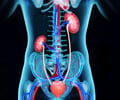New Ray of Hope For Kidney Transplantation Patients With Hepatitis C - Liver diseases secondary to hepatitis C virus (HCV) infection are an important cause of mortality and morbidity in kidney transplant recipients and dialysis patients.
As a policy, most countries ban the use of kidneys from donors who appear sero-positive for HCV because hepatitis C virus (HCV) infection is transmissible through organ donation. However, considering the present scenario of an imbalance in the demand and supply, where need for transplantation greatly exceeds the supply of donated kidneys, the current thought seems to be towards accepting such donors for HCV postive recipients.For the past several years, researchers from Spain have been transplanting kidneys from HCV-sero-positive donors into HCV-sero-positive recipients. Now the analysis of the results of such transplants indicates that this controversial practice can be given a green signal under some circumstances. Overall this shift would take care of some of the shortage of Kidneys.
Dr. Jose Morales, Associate Professor of Medicine in the Renal Transplant Unit, University Hospital, Madrid, discovered in the early years of this study that the viral load increased after transplantation in four out of five HCV-sero-positive recipients who did not otherwise havean active infection prior to receiving a kidney transplant from an HCV-sero-positive donor (viral load <100 copies per ml of HCV RNA). After the year 1993, Dr. Morales and team limited the use of kidneys from sero-positve donors to recipients with an active HCV infection at the time of transplantation and it showed positive and improved results.
Corresponding author of the study, Dr. Jose confirms that, “It is possible to transplant kidneys from HCV-sero-positive donors into HCV-RNA-positive recipients safely without many compilations”.
In his study, out of 468 HCV-sero-positive transplant recipients, 162 received a kidney from HCV-sero-positive donor, and the rest received organs from HCV-sero-negative donors.
Looking at the results he says that, “Long-term patient survival, graft survival and rates of liver disease are favorable and similar to those obtained with transplantation using kidneys from HCV-seronegative donors”.
In countries where HCV rates are endemically very high and several patients awaiting transplantation are HCV-sero-positive, this research can have positive and important implications. Looking at the positive side of it, Dr. Morales comments, “This way, more organs could be made available for transplantation purposes”.
Some other studies had already depicted that transplantation of HCV-sero-positive recipients with kidneys from HCV-sero-positive donors definitely improves their survival rate as opposed to remaining on the waiting list and during the course, waiting list times are also gets reduced.
Dr. Morales and his colleagues consider this strategy to be ethically acceptable provided sufficient information is provided to the potential recipient while obtaining their consent for the prodedure and they are made aware of all the pros and cons. The researchers also recommend further prospective studies to investigate the influence of donor HCV viral load on transplantation outcomes. This should also be determined whether donor and recipient HCV genotype matching would avoid potential HCV super-infection.
Reference:
http://www.nature.com/nrneph/journal/v7/n1/full/nrneph.2010.163.html
Source-Medindia















